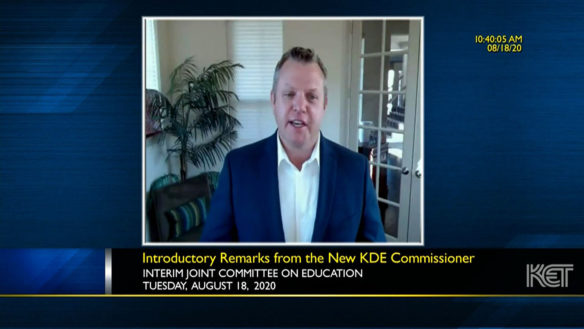
At its Aug. 18 meeting, the Kentucky General Assembly’s Interim Joint Committee on Education was introduced to Jason Glass, Kentucky’s next education commissioner and chief learner.
Photo courtesy of the Kentucky Department of Education
- Jason Glass emphasized his concerns about the potential economic impact COVID-19 will have on school districts moving forward.
- Also during the Aug. 18 meeting, The Prichard Committee Student Voice Team shared highlights of a recent report on how the COVID-19 pandemic impacted students last school year.
By Jacob Perkins
jacob.perkins@education.ky.gov
At its Aug. 18 meeting, the Kentucky General Assembly’s Interim Joint Committee on Education was introduced to Jason Glass, Kentucky’s next education commissioner and chief learner.
Calling in remotely from his current home in Colorado, Glass discussed the upcoming school year for the Commonwealth’s public school districts.
“As we move toward this fall, no one can say with certainty what it will bring,” he said. “I believe that we’ll all need to display flexibility, adaptability and extend each other a great deal of grace in these coming months.”
In most Kentucky counties, the school district is the largest and most stable employer, Glass said. He emphasized his concerns about the potential economic impact COVID-19 will have on districts moving forward.
“This may be another challenge we have to support our schools through as they have to shrink the size of their organizations to match their new revenue realities,” Glass said.
Additionally, Kentucky’s schools will have the challenge of advancing the work of equity and anti-racism, Glass said.
“I look forward to working in partnership with our districts to support them on that issue,” he said. “At the very center of our moral purpose in public education is providing every child the opportunity to expand their potential and pursue the American dream.
“We have to ensure that these opportunities are there for our Black and brown students as well.”
According to Glass, this work is long overdue, not just in Kentucky, but across the country. During the July 10 Kentucky Board of Education (KBE) meeting, the board unanimously approved a resolution affirming its commitment to racial equity in Kentucky’s public schools.
Also, staff at the Kentucky Department of Education recently took part in the first of a series of implicit bias trainings. Interim Education Commissioner Kevin C. Brown has said he hopes similar trainings will be made available at the district level.
A native of Brandenburg, Ky., and a 1990 graduate of Meade County High School, Glass was announced as Kentucky’s next education commissioner at the July 10 KBE meeting. He has been serving as superintendent and chief learner for Jeffco Public Schools in the metro Denver area since 2017. Prior to that, he served as the superintendent of Eagle County Schools in Colorado and as Iowa’s Director of Education, which is that state’s chief state school officer, from 2010 to 2013. Glass began his teaching career as a high school social studies teacher for Hazard Independent Schools.
To provide for a smooth and efficient transition, Glass’ contract allows him to work up to 15 days between Aug. 1 and Sept. 14 – his official start date.
Committee Co-Chair Rep. Regina Huff (R-Williamsburg), told Glass “We look forward to working with you as well to ensure students of the Commonwealth receive a world-class education and we wish you the best with your transition with your family and your move home to Kentucky.”
Presentation from the Prichard Student Voice Team
Also during the Aug. 18 meeting, The Prichard Committee Student Voice Team shared highlights of a recent report on how the COVID-19 pandemic impacted students last school year.
Brigitte Blom Ramsey, executive director of The Prichard Committee, said once the COVID-19 pandemic began to affect Kentucky, the committee turned its attention “to focusing on innovation.”
Out of that focus on innovation, the student committee launched a “Coping with COVID-19” survey and received more than 10,000 responses from students across Kentucky. All 120 counties were represented.
The survey measured four main topics for students: their educational experience following non-traditional instruction; their physical and mental wellness; changes in their home lives; and their plans for the future.
Based on the results, more than half of the surveyed students reported feeling a decrease in meaningful education during remote instruction. There also were decreases in student motivation and engagement.
As many Kentucky school districts plan on beginning the 2020-2021 school year utilizing NTI, the student voice team recommends encouraging teachers to work alongside students when developing policies that support students in varied home environments. Based on the findings, surveyed students reported feeling more motivated when teachers initiated contact.
The group added that more mental health services need to be made available to students. One way to do this is by increasing counselor availability for students.
According to the survey results, students who identified themselves as “poor” were less likely to have access to reliable internet and rural students were three times more likely to report never having access to reliable internet.
Other Agenda Items
The committee also heard testimony from Eric Kennedy, director of advocacy for the Kentucky School Boards Association; Jim Flynn, executive director of the Kentucky Association of School Superintendents; and Superintendent Chuck Adams of Spencer County Schools. The three testified in response to Gov. Andy Beshear’s recommendation to delay in-person instruction until at least Sept. 28.
MORE INFO …
- Interim Joint Committee on Education
- Kentucky Department for Public Health’s COVID-19 webpage
- KDE’s COVID-19 webpage
- COVID-19 Hotline (800) 722-572




Leave A Comment